Six Months In
Lessons from Carlos Murillo’s Residency at Adventure Stage
The Andrew W. Mellon Foundation’s National Playwright Residency Program asks playwrights and their home companies to periodically document the residency experience on HowlRound, as a way of sharing knowledge, models, challenges and impacts with the broader theatre community. Last October, Adventure Stage and resident playwright Carlos Murillo published their first installment on the making of Augusta and Noble, the project that brought playwright and organization together in 2013. Now they return for a conversation about the first six months of the residency and the specific impact it has had on the development of new works at Adventure Stage.
Carlos Murillo: Adventure Stage is six months into the Andrew W. Mellon Foundation’s National Playwright Residency Program. How has it been from your perspective? How has the presence of a playwright impacted the company thus far?
Tom Arvetis: It’s safe to say that the residency’s impact has been pretty immediate. It helped, of course, that you have history with us. You know the community we serve. You recognized, even if only superficially, how we fit into the larger context of the Settlement House. I think that’s why you wanted to be in residence here—because you were intrigued by work we are doing with community. So we were able to really hit the ground running.
We’re now in year five of a journey that started with the development and production of your play Augusta and Noble. Back then we were really flying blind in terms of process—we’d never created a new play seeking input and participation from community members. Since then, we’ve made important strides in terms of codifying the process, though I know there is still more work to be done.
When the opportunity to have you on staff became a reality, I wanted to prioritize that work. Our process operates with a lot of moving parts. Taking a long view, we really need to clarify our process for playwrights who might be new to our brand of work. It’s one thing to be new to community-based work, but we are also a theatre for young audiences and families. In effect, you’ve become the “insider” who both gives the organization an important perspective on how to successfully engage playwrights as well as gives future playwrights a way in to our process.
What role can Adventure Stage—or any theatre for that matter—assume in the mission of disrupting generational poverty?
I haven’t even begun to mention the specifics of how you’ve impacted our three-year planning process! Can you talk a bit about that?
Carlos: Since we first started collaborating back in 2013, I've tried to be very mindful of the fact that ASC is imbedded in a larger social service organization, and that connecting the theatre's mission to that of the Settlement House is of prime importance.
Early in the residency, I met with Ron Manderschied, the President of the Settlement House. Ron has been in the position for thirty-five years and is only the third leader of this 125 year old organization, so his long institutional memory and vision for the organization seemed like an ideal place to orient myself to the organization's ethos, how it has evolved over time, and what the future might hold. Prior to the start of the residency, the Settlement House underwent a concerted effort to break down silos between program areas (which include educational programs, a food bank, emergency services for families, and more) and bring more awareness to what is happening across the organization and the unifying ground that links the wide variety of activities.
In that meeting, Ron stated that the connective tissue for all of the programs is the idea that the Settlement House exists as a force to disrupt generational poverty. He also provided me with some sobering statistics: 36 percent of Chicago's children live in poverty; almost 92 percent of those children are black and Latino; 70 percent of children born into poverty will never escape it; and only 14 percent of Chicago Public School children will graduate from college. The system is stacked against the poor.
This raised a challenging question: what role can Adventure Stage—or any theatre for that matter—assume in the mission of disrupting generational poverty? Reframing the question this way really galvanized us, leading to some serious re-visioning of the work of our theatre.
Tom: It was so incredibly helpful to me to see you respond to Ron’s comments the way you did. Truthfully, I’d been a part of the “disrupting generational poverty” conversation for several months, but it wasn’t until you came in with fresh eyes and ears that I recognized the opportunity we’d been missing. It was a great example of the value of a fresh perspective.
Carlos: Yes, I think it was especially helpful to look at our work through this lens for several reasons. First, asking how a theatre might play a role in disrupting generational poverty seems like a tall order, which could inspire new thinking and focus. Second, it felt a little bit like going in circles with the previous paradigm, struggling to define our community as if we needed one unifying definition in order to create community-focused works. Community is such a mercurial idea, and since the Settlement House serves many communities across the city, it seemed like we would have to redefine the meaning of it with each project. By shifting the focus to generational poverty, though, we could actually think more systemically about the kind of work we produce, the writers we commission, and how that ties into the very concrete work and actions undertaken by the other programs in the Settlement House.
We have chosen ‘Literacy’ as the theme to our next season. After that, we will embrace ‘Hunger,’ and the year after that we will look at ‘Shelter.’ Each of these themes will inform our search for extant plays to produce alongside the new plays we are developing.
Tom: If we were to look at our recent body of work from ten thousand feet, it would appear very project-based, without a lot of continuity from one project to the next, except perhaps in our developmental approach to making new work. But the idea that our theatre exists within a spectrum of partner programs to confront the challenges of generational poverty forces us to confront those systemic challenges you mention. It necessitates that we do our homework, come to terms with the body of research that exists about society’s most vulnerable citizens, and get comfortable naming those obstacles that impede transformation. It didn’t take long for us to come up with a laundry list of disadvantages: malnutrition, chronic ill health, unemployment, inadequate housing, inadequate education, proximity to crime, isolation, lack of opportunity to participate in civic, social, and cultural life. These are very real challenges for too many people living in Chicago. And it suddenly became so clear how we might do our part to serve our community.
Since so much of Settlement programming is dedicated to providing young people with a quality education, we have chosen “Literacy” as the theme to our next season. After that, we will embrace “Hunger,” and the year after that we will look at “Shelter.” Each of these themes will inform our search for extant plays to produce alongside the new plays we are developing. They’ll also allow us to commission playwrights who have an authentic interest in the subject matter and the playwrights will understand from the beginning the kind of conversation we are asking them to be a part of.
Carlos: I feel that landing on this new approach has really energized not only the company and its artists, but the wider organization as well. It also affords us the unique opportunity to have an extended conversation with the audience over a season as opposed to just individual productions.
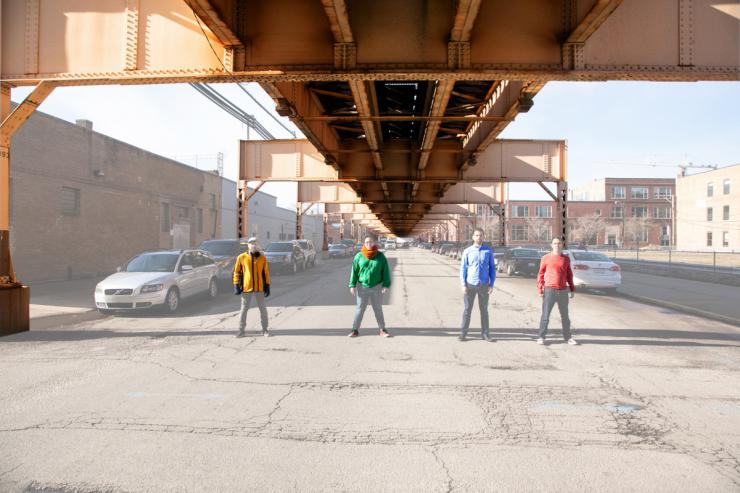
Tom: It definitely brings together so many critical elements that are tied to our identity as a Settlement program, as a theatre rooted in a community, and ultimately as a theatre for young people that places a premium on telling stories that inspire hope, that encourage young people to be agents of change, and that instill the values of critical thinking and civic engagement. Stories become a kind of currency we all share and are bound by, whether it’s among colleagues or in direct contact with our neighbors.
Carlos: I do think there is something unique about our using mythological stories as an entry point for engaging with students and the wider community. Bringing an existing story to the table—as you did by bringing the Prometheus myth to CPS schools as a starting point for a critical literacy discussion around violence and the condition of schools in Chicago—allows for us to stay true to the organization’s original mission of “telling heroic stories for young people” while using those stories as a touchstone to begin addressing the pressing problems we face in Chicago. As we launch our first project under this new framework, I am especially excited about the relationship between the mythological source—in this case, the Popol Vuh—and the unique take on literacy of our commissioned playwright Lucas Baisch.
Tom: What first drew me to Lucas’ work was his interest in creating unique universes where his stories take place. World-building is so incredibly important to the creation of work for younger audiences and I’m excited to work with a playwright who naturally starts from this place. I was not familiar with the Popol Vuh before Lucas had brought it to our attention. It’s a mythology rich with metaphor and magic where the stakes are incredibly high. This is fertile ground for the process on which we are about to embark.
Lucas also has a particular interest in digital technology and the profound influence it’s having on all of our lives. In honoring the playwright’s voice, are there innovative and essential ways to incorporate digital technology into the story? And can we double down by finding ways to use this technology that is inherently theatrical? Given that our audience is predominantly native to the digital world we all now inhabit, this feels full of possibility.
How these two points of entry collide is what, I think, makes this collaboration so exciting. We’re all excited to see what the future holds!


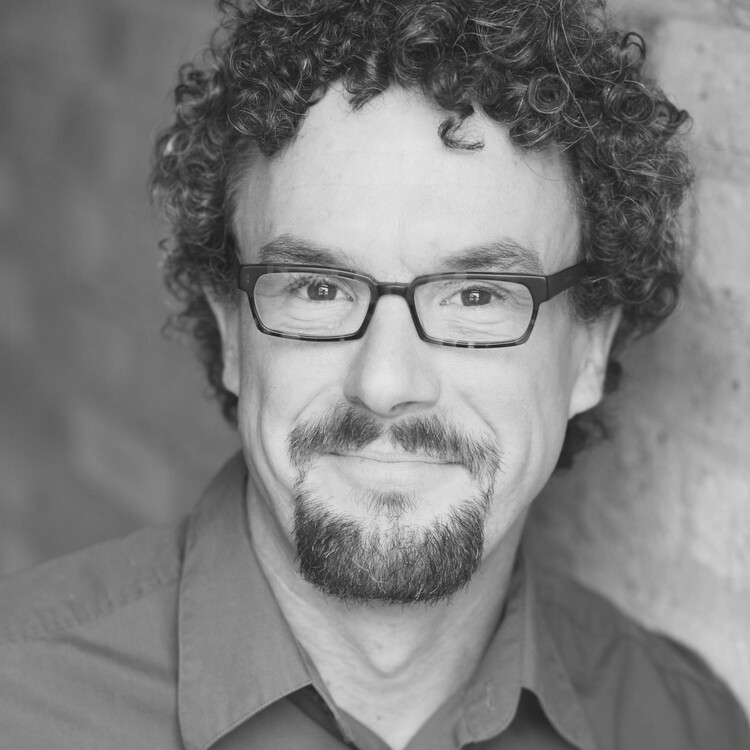
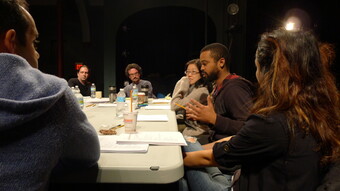

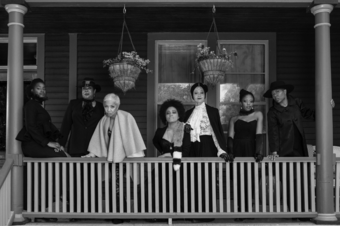
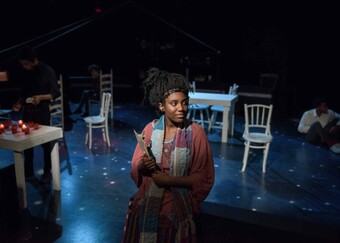

Comments
The article is just the start of the conversation—we want to know what you think about this subject, too! HowlRound is a space for knowledge-sharing, and we welcome spirited, thoughtful, and on-topic dialogue. Find our full comments policy here